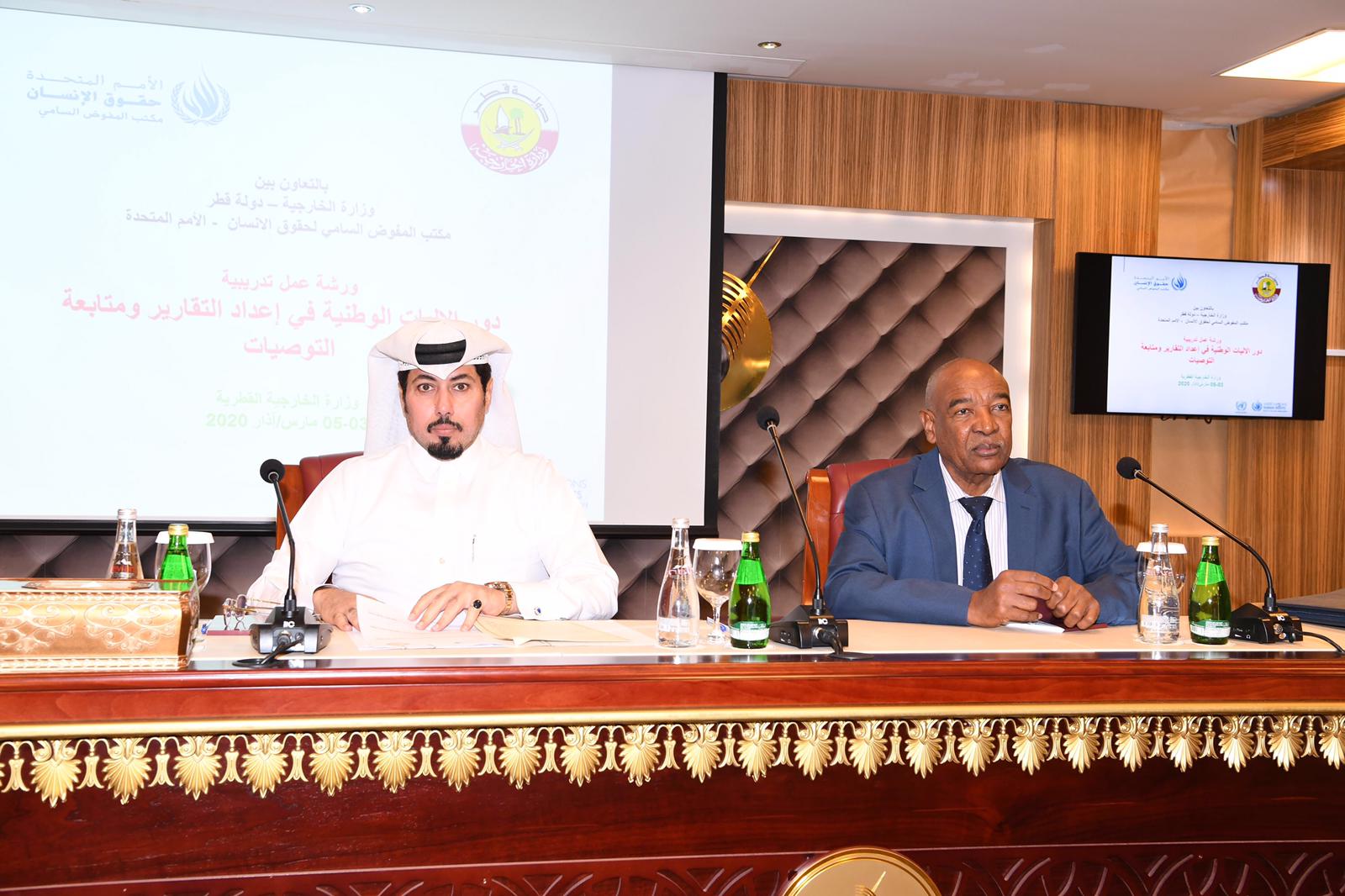Ministry of Foreign Affairs Organizes Training Workshop on International, Regional Human Rights Mechanisms

Doha / Information Office / March 03
The Human Rights Department at the Ministry of Foreign Affairs organized a training workshop, in cooperation with the United Nations Human Rights Training and Documentation Center for South-West Asia and the Arab Region in Doha and the Treaty Body Capacity Building Programme in OHCHR in Beirut. The workshop, which will continue until Thursday, dealt with the role of national mechanisms in preparing reports, following up on recommendations and working with international and regional human rights mechanisms, with the participation of representatives of various ministries, institutions and relevant civil society organizations.
The workshop aims to enhance the national experience in Qatar by advancing the four main tasks and roles of the national mechanisms for preparing reports and follow-up, as well as the study of regional and international comparative experiences in establishing national mechanisms for implementation, reporting and follow-up.
In his opening speech, HE the Assistant Director of the Human Rights Department at the Ministry of Foreign Affairs Sheikh Mohammed bin Youssef Al-Thani said that the organization of this workshop, which comes in the framework of continuous cooperation between the State of Qatar and the United Nations, reflects the increased interest the State attaches to the issue of the promotion and protection of human rights, which represents a strategic choice for it and forms the backbone of its comprehensive reform policy.
He stressed that human development and the protection and promotion of human rights are at the top of Qatar's priorities, pointing out that this was underpinned in Qatar National Vision 2030, the first National Development Strategy 2011-2016 and second National Development Strategy 2018-2022, which included important points that touch on main issues of human rights in the fields of education, health, the environment, the rights of expatriate workers, women's empowerment and children's rights.
His Excellency presented a summary of the most important and prominent developments recently taken by Qatar in the field of human rights, the most important of which are Decree No. 40 of 2018 on the accession of the State of Qatar to the International Covenant on Civil and Political Rights and Decree No. 41 of 2018 on the accession of Qatar to the International Covenant on Economic, Social and Cultural Rights, in addition to forming a committee according to the Cabinet decision issued at its regular meeting No. 27 of 2018 to study the legislation in force in Qatar and its compatibility with the provisions and articles of the International Covenant on Civil and Political Rights and the International Covenant on Economic, Social and Cultural Rights.
In this regard, His Excellency noted the formation of a working group in accordance with the decision the Cabinet issued at its regular meeting No. 2 of 2020 to study the recommendation of the National Human Rights Committee to join the International Convention for the Protection of All Persons from Enforced Disappearance and the Optional Protocol to the Convention against Torture. establishing a higher committee to prepare for the Shura Council elections.
He said that the most important and prominent developments also included the issuance of Amiri Decree No. 47 of 2019 to establish a higher committee to prepare for the Shura Council elections and determine its terms of reference as the second article of the Amiri Decree stipulated that the Supreme Committee will take charge of all effective tasks in preparing for the Shura Council elections, in particular overseeing the preparation of draft legislative tools necessary for the Shura Council elections and proposing a timetable for the election process.
His Excellency further added that one of the most important and prominent developments was the issuance of Cabinet Decision No. 26 of 2019 to establish a national committee for women, children, older persons and persons with disabilities, which comes in compliance with the recommendations of the monitoring committees by establishing an independent central government mechanism concerned with the rights of women, children, the elderly and persons with disabilities.
He also added that one of the most important and prominent developments was the approval to form a permanent committee to prepare State reports for regional international mechanisms.
He stressed that Qatar has become a party to seven of the fundamental human rights agreements, noting that the formation of the national committee for women, children, older persons and persons with disabilities is chaired by the Minister of Administrative Development, Labor and Social Affairs and includes in its membership various government agencies, in addition to civil society organizations and the National Human Rights Committee.
For his part, Director of the UN Human Rights Training and Documentation Centre for South-West Asia and the Arab Region Dr. Abdel Salam Sidahmed said that the topic of the workshop is of interest to the UN General Assembly and member states, adding that they seek to support the capabilities of mechanisms in the State of Qatar to interact more with the international mechanisms and the various contracting parties.
He added that the accession of the State of Qatar to the International Covenant on Civil and Political Rights and the International Covenant on Economic, Social and Cultural Rights is a good step and framework for the promotion of human rights in the State of Qatar.

